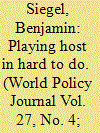|
|
|
Sort Order |
|
|
|
Items / Page
|
|
|
|
|
|
|
| Srl | Item |
| 1 |
ID:
101259


|
|
|
| 2 |
ID:
144555


|
|
|
|
|
| Summary/Abstract |
In the years immediately following independence, India's political leadership, assisted by a network of civic organizations, sought to transform what, how, and how much Indians ate. These campaigns, this article argues, embodied a broader post-colonial project to reimagine the terms of citizenship and development in a new nation facing enduring scarcity. Drawing upon wartime antecedent, global ideologies of population and land management, and an ethos of austerity imbued with the power to actualize economic self-reliance, the new state urged its citizens to give up rice and wheat, whose imports sapped the nation of the foreign currency needed for industrial development. In place of these staples, India's new citizens were asked to adopt ‘substitute’ and ‘subsidiary’ foods—including bananas, groundnuts, tapioca, yams, beets, and carrots—and give up a meal or more each week to conserve India's scant grain reserves. And as Indian planners awaited the possibility of fundamental agricultural advance and agrarian reform, they looked to food technology and the promise of ‘artificial rice’ as a means of making up for India's perennial food deficit. India's women, as anchors of the household—and therefore, the nation—were tasked with facilitating these dietary transformations, and were saddled with the blame when these modernist projects failed. Unable to marshal the resources needed to undertake fundamental agricultural reform, India's planners placed greater faith in their ability to exercise authority over certain aspects of Indian citizenship itself, tying the remaking of practices and sentiments to the reconstruction of a self-reliant national economy.
|
|
|
|
|
|
|
|
|
|
|
|
|
|
|
|
|
|
|
|
|